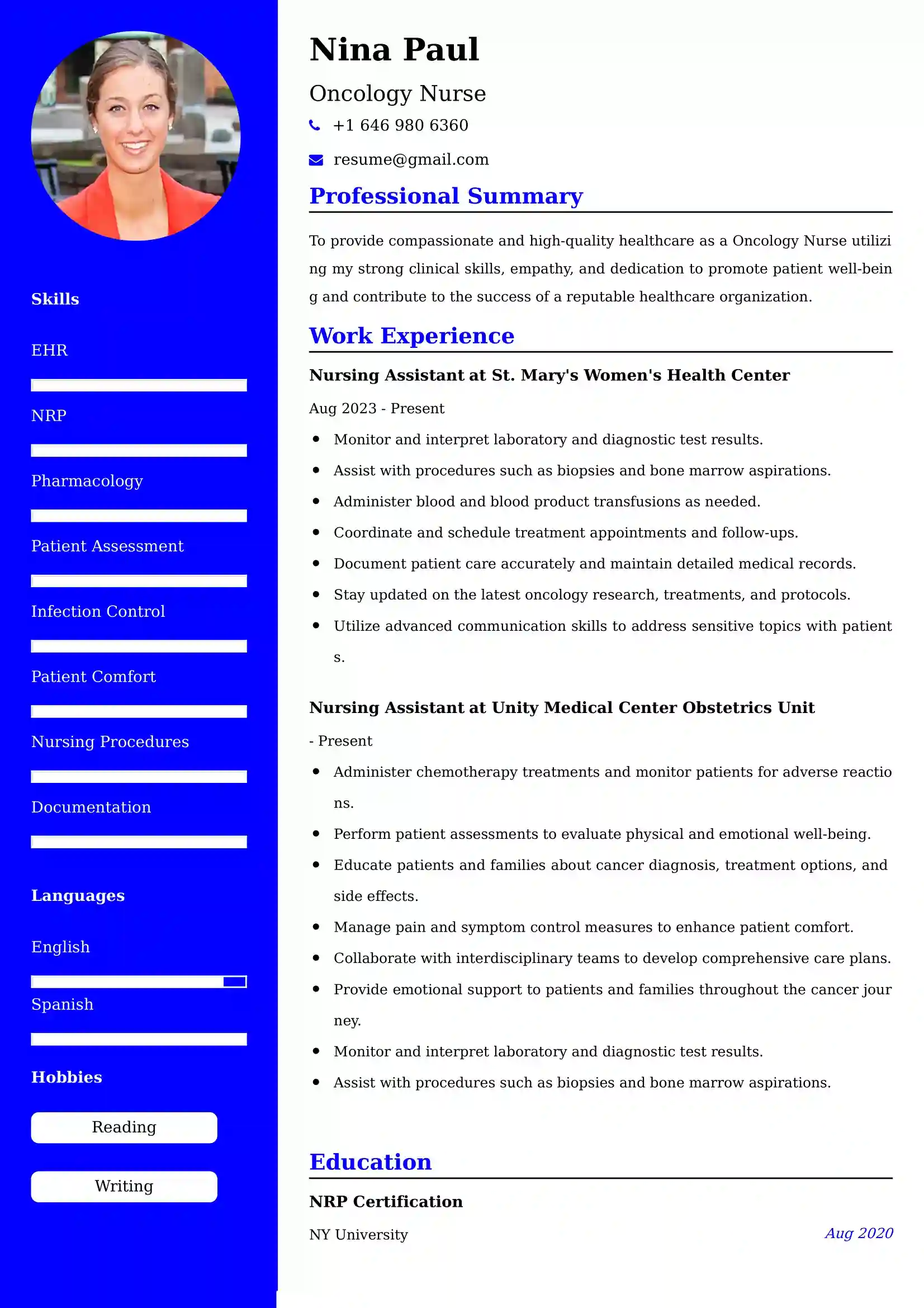Resume
Resume examples for top Oncology Nurse jobs
Use the following guidelines and resume examples to choose the best resume format.
Oncology Nurse Resume Sample

About Oncology Nurse Resumes
Aspiring to become an Oncology Nurse, specializing in the care of cancer patients and providing essential support during their challenging journey? Crafting an effective resume is your essential first step toward success in this specialized and compassionate nursing role. Your resume serves as your professional introduction to potential employers, showcasing your qualifications and expertise in cancer care, chemotherapy administration, pain management, and emotional support for patients and their families.
Salary Details (INR)
In India, Oncology Nurse salaries can vary based on factors such as experience, location, and the healthcare facility. On average, Oncology Nurses can expect to earn anywhere from INR 3 lakhs to INR 7 lakhs or more per annum. However, these figures may fluctuate significantly based on individual circumstances and the specific demands of providing oncology care.
Key Skills for Oncology Nurse Resumes
When crafting your Oncology Nurse resume, it's essential to emphasize specific key skills that are highly valued in this role. These may include:
- Cancer Care: Highlight your expertise in caring for cancer patients, including assessing their needs, managing symptoms, and providing education on treatment options.
- Chemotherapy Administration: Mention your ability to safely administer chemotherapy drugs, monitor patients during treatment, and manage potential side effects.
- Pain Management: Emphasize your skills in assessing and managing pain in cancer patients, utilizing various pain relief techniques and medications.
- Patient and Family Support: Showcase your capacity to provide emotional support and education to patients and their families, helping them navigate the challenges of cancer treatment.
- Collaborative Care: Highlight your ability to work closely with oncologists, healthcare teams, and support staff to ensure comprehensive and coordinated cancer care.
Do's and Don'ts for Oncology Nurse Resumes
Do's:
- Customize Your Resume: Tailor your resume for each specific job application, emphasizing your relevant qualifications and oncology nursing experiences.
- Highlight Achievements: Focus on accomplishments such as improved patient outcomes, contributions to cancer care teams, and patient and family satisfaction.
- Use Action Verbs: Start bullet points in your work experience section with strong action verbs to describe your responsibilities and achievements more vividly.
- Include Certifications: Mention any relevant certifications, such as Oncology Nursing Certification or Chemotherapy Biotherapy Provider, to demonstrate your expertise.
- Quantify Achievements: Whenever possible, use quantifiable metrics to demonstrate your impact, such as reductions in pain levels or successful chemotherapy administrations.
Don'ts:
- Neglect Proofreading: Carefully proofread your resume to eliminate typos, grammatical errors, and formatting issues.
- Overload with Medical Jargon: Avoid using excessive medical terminology that may be challenging for non-medical readers, including HR professionals.
- Exaggerate or Misrepresent Information: Always be truthful about your qualifications and experiences.
- Omit Continuing Education: If you've completed any relevant courses, workshops, or conferences related to oncology nursing, include them in your resume to demonstrate your commitment to professional development.
- Provide References on the Resume: It's not necessary to include references on the resume. Provide them separately when requested by the employer.
Frequently Asked Questions (FAQs) on Resume Formats for Oncology Nurses
- Is it essential to include a summary or objective statement on my Oncology Nurse resume?
- While optional, a well-crafted summary can provide context and highlight your career goals.
- Should I list my educational background and certifications on my resume?
- Yes, prominently feature your relevant educational qualifications and certifications to demonstrate your expertise.
- Is it necessary to list personal interests or hobbies on my resume?
- While not obligatory, including relevant hobbies or interests can provide insights into your personality.
- How can I demonstrate my commitment to patient-centered care on my resume?
- Mention specific instances where you provided compassionate care, communicated effectively with cancer patients and their families, and contributed to positive patient outcomes in your work experience section.
- Should I include references on the resume?
- Typically, references are not included on the resume. Provide them separately when requested by the employer.
More Resume Examples for the Next Step in Your Oncology Nurse Resume Career jobs
- Acute Care Nurse Resume
- Advanced Practice Rn Resume
- Caregiver Resume
- Er Nurse Resume
- Geriatric Nurse Practitioner Resume
- Labor And Delivery Nurse Resume
- Lpn Resume
- Nurse Practitioner Resume
- Nursing Assistant Resume
- Oncology Nurse Resume
- Pediatric Nurse Resume
- Registered Nurse Resume
- Public School Nurse Resume
- Trauma Nurse Resume
More Cover Examples for the Next Step in Your Oncology Nurse Cover Career jobs
- Acute Care Nurse Cover Letter
- Advanced Practice Rn Cover Letter
- Caregiver Cover Letter
- Chief Nursing Officer Cover Letter
- Er Nurse Cover Letter
- Geriatric Nurse Practitioner Cover Letter
- Labor And Delivery Nurse Cover Letter
- Lpn Cover Letter
- Nurse Practitioner Cover Letter
- Nursing Assistant Cover Letter
- Oncology Nurse Cover Letter
- Pediatric Nurse Cover Letter
- Registered Nurse Cover Letter
- Public School Nurse Cover Letter
- Trauma Nurse Cover Letter
Get started with a winning resume template
800+ Resume Samples in ATS Format, HR Approved for Your Success
Step into the world of resume excellence with our comprehensive collection of 800+ samples, meticulously designed in ATS-friendly format and rigorously approved by HR professionals. Your path to success starts here as you craft a resume that effortlessly navigates through automated systems and captures the attention of hiring experts. Explore now and take the first step towards landing your dream job.
Resume Examples
What clients say about us
Our Resume Are Shortlisted By










